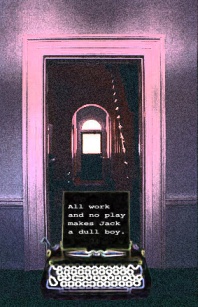
An anthology of dreams
Getting ready for Capricon, and I have miles to go before I sleep. So, huzzah! Today is free fiction day on CB’s Mojo. I’m sharing a story that previously appeared in an anthology produced by The Journey.
The anthology, Drops of Midnight, was edited by Steven White. About a dozen of us (including such luminaries as Tim Yao and Katherine Lato) contributed. Here’s the teaser from the back cover:
In the dark alleys and gaslit pubs of lower London you can buy almost anything—including dreams.
Here you can purchase small glass bottles offering tales stolen from the subconscious. Taste the longing and regret of a woman escaping her father’s fate and trying to live up to his memory. Experience the dreams of a child trapped in a coma, needing to fly. Feel the pain and nobility of a dreamer living through the Holocaust, or a general on the eve of battle. Some dreams are surreal encounters, like meeting a faded celebrity; others are dark nightmares, like a demon torturing a man for his past. One woman daydreams of a lost loved one; another man makes a bargain that may cost him his dreams.
Sample a bottle of stolen dreams—twelve stories spanning time and place from writers exploring daydreams and nightmares.
Be careful which one you open…
This is how my story begins:
Belarus Lost
In honor of the Belarus Free TheatreThis isn’t my room.
Every morning it takes me awhile to remember that I’m not home. Only it isn’t morning yet. The only light in the room comes from a tiny amber LED on my cell phone as it charges.
My roommate and fellow actor, Elizaveta, snores softly in the next bed, undisturbed by whatever roused me. Of course, I wasn’t fully asleep. I haven’t slept well since we escaped.
We barely got out of Minsk with our skins intact. I’m still waiting for my body to release all the fear and tension of those last miserable days, when we didn’t know how many of us would get away, and how many would spend the next fifteen years—maybe more—in prison. Assuming we lived through the interrogations, that is.
Mercifully, all nine of us made it to New York. The play that we risked everything to perform was well received. Our American hosts praised our bravery and provided a house for us to stay in. They’ve also been trying to help us figure out what to do when the month-long theatre festival for which we were booked is over. One after another, they present solutions for us to consider. Aleksey and Natalya, our leaders, enthusiastically examine every idea they offer.
Our situation has begun to exhaust me. When I am away from the others, I wonder why I didn’t just seek work as an office clerk or a waitress. At least waitresses aren’t imprisoned for doing their jobs. But no, I had to have the magical electricity of the theatre, the thrill of passionate discussions late into the night, the certainty that our plays, which dramatize Lukashenko’s worst abuses, would save our country from his dictatorship. And finally, as it turned out, the necessity to flee if we wanted to reveal the truth about Lukashenko’s regime to a wider audience.
I don’t mean to make a sound, but something like a moan escapes my lips. Elizaveta stirs. If she finds me awake, she’ll ask what’s wrong and try to comfort me. I don’t think I can take that again. I’m tired of being the only one in our group who can’t seem to cope. I creep out of our room and close the door.
Now I don’t know what to do. I’m too jumpy to even consider sleeping. I thought a noise must have awakened me, but though I strain my ears, I hear nothing but the night traffic outside. I can’t just cower in the hallway. Of course no one is downstairs, but I won’t be able to relax until I’ve made sure.
I steal down the stairs in thick socks, wearing the old bathrobe that still smells of my mother’s potato babka. This house, lent to us by one of the rich New York theatre people, smells of a strong, scented cleaning product covering up mold, or old dust.
I look first into the dark kitchen. Nothing moves. I could turn on a light, but the street lamps outside, reflecting off a recent snowfall, provide enough light for me to be sure no one is in there.
Through a swinging door, I see no one in the deserted dining room. The living room, filled with mismatched, sagging furniture, lies across the central hall. I’m almost done making certain I’m the only one down here, but I won’t be able to let my breath out until I’ve checked the last room. I move back into the hall and approach the last door, which opens onto the library. And then I see.
The door is ajar. I push it open and go in. The room is so cold my breath comes in sharply. Immediately I see the reason, but the shock makes me unable to speak or scream. A window is fully open and a light-haired man helps a dark-haired, bearded companion over the sill and into the room.
To continue reading, click here.
If you’re interested in the rest of the anthology, here it is on Amazon.



